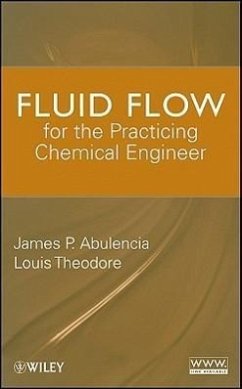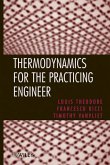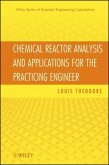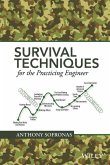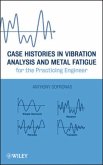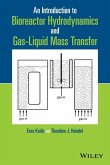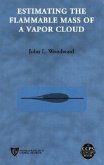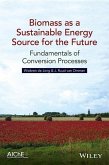- Gebundenes Buch
- Merkliste
- Auf die Merkliste
- Bewerten Bewerten
- Teilen
- Produkt teilen
- Produkterinnerung
- Produkterinnerung
Enables you to easily advance from fluid flow principles to applications Fluid Flow for the Practicing Chemical Engineer helps readers move comfortably from fluid flow principles to fluid flow applications. From elementary flow mechanics to the laws of conservation of mass, energy, and momentum, the book covers all the basic principles of fluid flow. The book also demonstrates how these principles underlie a broad range of applications, from laminar flow to filtration and ventilation. Lastly, the book explores special related topics, including environmental concerns, biomedical engineering,…mehr
Andere Kunden interessierten sich auch für
![Thermodynamics for the Practicing Engineer Thermodynamics for the Practicing Engineer]() Louis TheodoreThermodynamics for the Practicing Engineer165,99 €
Louis TheodoreThermodynamics for the Practicing Engineer165,99 €![Chemical Reactor Analysis and Applications for the Practicing Engineer Chemical Reactor Analysis and Applications for the Practicing Engineer]() Louis TheodoreChemical Reactor Analysis and Applications for the Practicing Engineer162,99 €
Louis TheodoreChemical Reactor Analysis and Applications for the Practicing Engineer162,99 €![Survival Techniques for the Practicing Engineer Survival Techniques for the Practicing Engineer]() Anthony SofronasSurvival Techniques for the Practicing Engineer59,99 €
Anthony SofronasSurvival Techniques for the Practicing Engineer59,99 €![Case Histories in Vibration Analysis and Metal Fatigue for the Practicing Engineer Case Histories in Vibration Analysis and Metal Fatigue for the Practicing Engineer]() Anthony SofronasCase Histories in Vibration Analysis and Metal Fatigue for the Practicing Engineer104,99 €
Anthony SofronasCase Histories in Vibration Analysis and Metal Fatigue for the Practicing Engineer104,99 €![An Introduction to Bioreactor Hydrodynamics and Gas-Liquid Mass Transfer An Introduction to Bioreactor Hydrodynamics and Gas-Liquid Mass Transfer]() Enes KadicAn Introduction to Bioreactor Hydrodynamics and Gas-Liquid Mass Transfer122,99 €
Enes KadicAn Introduction to Bioreactor Hydrodynamics and Gas-Liquid Mass Transfer122,99 €![Estimating the Flammable Mass of a Vapor Cloud Estimating the Flammable Mass of a Vapor Cloud]() John L WoodwardEstimating the Flammable Mass of a Vapor Cloud248,99 €
John L WoodwardEstimating the Flammable Mass of a Vapor Cloud248,99 €![Biomass as a Sustainable Energy Source for the Future Biomass as a Sustainable Energy Source for the Future]() Wiebren De JongBiomass as a Sustainable Energy Source for the Future148,99 €
Wiebren De JongBiomass as a Sustainable Energy Source for the Future148,99 €-
-
-
Enables you to easily advance from fluid flow principles to applications Fluid Flow for the Practicing Chemical Engineer helps readers move comfortably from fluid flow principles to fluid flow applications. From elementary flow mechanics to the laws of conservation of mass, energy, and momentum, the book covers all the basic principles of fluid flow. The book also demonstrates how these principles underlie a broad range of applications, from laminar flow to filtration and ventilation. Lastly, the book explores special related topics, including environmental concerns, biomedical engineering, open-ended problems, and the economics of fluid flow applications. This text is divided into six parts, enabling readers to easily gain a foundation in basic principles and then learn how to apply them in practice: * Part One: Introduction to Fluid Flow * Part Two: Basic Laws * Part Three: Fluid Transport Classification * Part Four: Fluid Flow Applications * Part Five: Fluid-Particle Applications * Part Six: Special Topics Throughout the text, numerous detailed examples demonstrate how principles are put into practice. Practice problems for each chapter, located on the text's accompanying Web site, enable readers to solve real-world problems similar to the ones that they will encounter on the job. Readers will gain a solid working knowledge of fluid flow principles and applications upon successful completion of this text. They will also be better prepared to address more advanced material and solve more complex problems.
Hinweis: Dieser Artikel kann nur an eine deutsche Lieferadresse ausgeliefert werden.
Hinweis: Dieser Artikel kann nur an eine deutsche Lieferadresse ausgeliefert werden.
Produktdetails
- Produktdetails
- Verlag: Wiley
- Seitenzahl: 600
- Erscheinungstermin: 1. Mai 2009
- Englisch
- Abmessung: 236mm x 152mm x 30mm
- Gewicht: 939g
- ISBN-13: 9780470317631
- ISBN-10: 0470317639
- Artikelnr.: 25933686
- Herstellerkennzeichnung
- Libri GmbH
- Europaallee 1
- 36244 Bad Hersfeld
- gpsr@libri.de
- Verlag: Wiley
- Seitenzahl: 600
- Erscheinungstermin: 1. Mai 2009
- Englisch
- Abmessung: 236mm x 152mm x 30mm
- Gewicht: 939g
- ISBN-13: 9780470317631
- ISBN-10: 0470317639
- Artikelnr.: 25933686
- Herstellerkennzeichnung
- Libri GmbH
- Europaallee 1
- 36244 Bad Hersfeld
- gpsr@libri.de
James P. Abulencia is an Assistant Professor at Manhattan College. He received his BS degree in chemical engineering from Manhattan College, and his PhD in chemical and biomolecular engineering from Johns Hopkins University. In addition to teaching fluid flow, his research interests include the role of shear stress in blood thrombus formation, the gene regulation of chondrocytes, and tissue engineering strategies of osteochondral tissue. Louis Theodore, PHD, is a Professor in the Chemical Engineering Department of Manhattan College. Dr. Theodore is coauthor of Introduction to Hazardous Waste Incineration, Second Edition; Handbook of Chemical and Environmental Engineering Calculations; author of Nanotechnology: Basic Calculations for Engineers and Scientists; and a contributor to Perry's Chemical Engineers' Handbook.
Preface.
Introduction.
I. Introduction to Fluid Flow.
1. History of Chemical Engineering-Fluid Flow.
1.1 Introduction.
1.2 Fluid Flow.
1.3 Chemical Engineering.
References.
2. Units and Dimensional Analysis.
2.1 Introduction.
2.2 Dimensional Analysis.
2.3 Buckingham Pi (π) Theorem.
2.4 Scale-Up and Similarity.
References.
3. Key Terms and Definitions.
3.1 Introduction.
3.2 Definitions.
References.
4. Transport Phenomena Versus Unit Operations.
4.1 Introduction.
4.2 The Differences.
4.3 What is Engineering?
References.
5. Newtonian Fluids.
5.1 Introduction.
5.2 Newton's Law of Viscosity.
5.3 Viscosity Measurements.
5.4 Microscopic Approach.
References.
6. Non-Newtonian Flow.
6.1 Introduction.
6.2 Classification of Non-Newtonian Fluids.
6.3 Microscopic Approach.
References.
II. Basic Laws.
7. Conservation Law for Mass.
7.1 Introduction.
7.2 Conversation of Mass.
7.3 Microscopic Approach.
References.
8. Conservation Law for Energy.
8.1 Introduction.
8.2 Conservation of Energy.
8.3 Total Energy Balance Equation.
References.
9. Conservation Law for Momentum.
9.1 Momentum Balances.
9.2 Microscopic Approach: Equation of Momentum Transfer.
References.
10. Law of Hydrostatics.
10.1 Introduction.
10.2 Pressure Principles.
10.3 Manometry Principles.
Reference.
11. Ideal Gas Law.
11.1 Introduction.
11.2 Boyle's and Charles' Laws.
11.3 The Ideal Gas Law.
11.4 Non-Ideal Gas Behavior.
References.
III. Fluid Flow Classification.
12. Flow Mechanisms.
12. 1 Introduction.
12.2 The Reynolds Number.
12.3 Strain Rate, Shear Rare, and Velocity Profile.
12.4 Velocity Profile and Average Velocity.
Reference.
13. Laminar Flow in Pipes.
13.1 Introduction.
13.2 Friction Losses.
13.3 Tube Size.
13.4 Other Considerations.
13.5 Microscopic Approach.
References.
14. Turbulent Flow in Pipes.
14.1 Introduction.
14.2 Describing Equations.
14.3 Relative Roughness in Pipes.
14.4 Friction Factor Equations.
14.5 Other Cosiderations.
14.6 Flow Through Several Pipes.
14.7 General Predictive and Design Approaches.
14.8 Microscopic Approach.
References.
15. Compressible and Sonic Flow.
15.1 Introduction.
15.2 Compressible Flow.
15.3 Sonic Flow.
15.4 Pressure Drop Equations.
References.
16. Two-Phase Flow.
16.1 Introduction.
16.2. Gas (G)-Liquid (L) Flow Principles: Generalized Approach.
16.3 Gas (Turbulent) Flow-Liquid (Turbulent) Flow.
16.4 Gas (Turbulent) Flow-Liquid (Viscous) Flow.
16.5 Gas (Viscous) Flow-Liquid (Viscous) Flow.
16.6 Gas - Solid Flow.
References.
IV. Fluid Flow Transport and Applications.
17. Prime Movers.
17.1 Introduction.
17.2 Fans.
17.3 Pumps.
17.4 Compressors.
References.
18. Valves and Fittings.
18.1 Valves.
18.2 Fittings.
18.3 Expansion and Contraction Effects.
18.4 Calculating Losses of Valves and Fittings.
18.5 Fluid Flow Experiment: Data and Calculations.
References.
19. Flow Measurement.
19.1 Introduction.
19.2 Manometry and Pressure Measurements.
19.3 Pitot Tube.
19.4 Venturi Meter.
19.5 Orifice Meter.
19.6 Selection Process.
Reference.
20. Ventilation.
20.1 Introduction.
20.2 Indoor Air Quality.
20.3 Indoor Air/Ambient Air Comparison.
20.4 Industrial Ventilation Systems.
References.
21. Academic Applications.
References.
22. Industrial Applications.
References.
V. Fluid-Particle Applications.
23. Particle Dynamics.
23.1 Introduction.
23.2 Particle Classification and Measurement.
23.3 Drag Force.
23.4 Particle Force Balance.
23.5 Cunningham Correction.
23.6 Liquid-Particle Systems.
23.7 Drag on a Flat Plate.
References.
24. Sedimentation, Centrifugation, Flotation.
24.1 Sedimentation.
24.2 Centrifugation.
24.3 Hydrostatic Equilibrium in Centrifugation.
24.4 Flotation.
References.
25. Porous Media and Packed Beds.
25.1 Introduction.
25.2 Definitions.
25.3 Flow Regimes.
References.
26. Fluidization.
26.1 Introduction.
26.2 Fixed Beds.
26.3 Permeability.
26.4 Minimum Fluidization Velocity.
26.5 Bed Height, Pressure Drop and Porosity.
26.6 Fluidization Modes.
26.7 Fluidization Experiment Data and Calculations.
References.
27. Filtration.
27.1 Introduction.
27.2 Filtration Equipment.
27.3 Describing Equations.
27.4 Filtration Experimental Data and Calculations.
References.
VI. Special Topics.
28. Environmental Management.
28.1 Introduction.
28.2 Environmental Management History.
28.3 Environmental Management Topics.
28.4 Applications.
References.
29. Accident and Emergency Management.
29.1 Introduction.
29.2 Legislation.
29.3 Health Risk Assessment.
29.4 Hazard Risk Assessment.
29.5 Illustrative Examples.
References.
30. Ethics.
30.1 Introduction.
30.2 Teaching Ethics.
30.3 Case Study Approach.
30.4 Integrity.
30.5 Moral Issues.
30.6 Guardianship.
30.7 Engineering and Environmental Ethics.
30.8 Applications.
References.
31. Numerical Methods.
31.1 Introduction.
31.2 Early History.
31.3 Simultaneous Linear Algebraic Equations.
31.4 Nonlinear Algebraic Equations.
31.5 Numerical Integration.
References.
32. Economics and Finance.
32.1 Introduction.
32.2 The Need for Economic Analyses.
32.3 Definitions.
32.4 Principles of Accounting.
32.5 Applications.
References.
33. Biomedical Engineering.
33.1 Introduction.
33.2 Definitions.
33.3 Blood.
33.4 Blood Vessels.
33.5 Heart.
34.6 Plasma/Cell Flow.
34.7 Biomedical Engineering Opportunities.
References.
34. Open-Ended Problems.
34.1 Introduction.
34.2 Developing Students' Power of Critical Thinking.
34.3 Creativity.
34.4 Brainstorming.
34.5 Inquiring Minds.
34.6 Angels on a Pin.
34.7 Applications.
References.
Appendix.
Index.
Introduction.
I. Introduction to Fluid Flow.
1. History of Chemical Engineering-Fluid Flow.
1.1 Introduction.
1.2 Fluid Flow.
1.3 Chemical Engineering.
References.
2. Units and Dimensional Analysis.
2.1 Introduction.
2.2 Dimensional Analysis.
2.3 Buckingham Pi (π) Theorem.
2.4 Scale-Up and Similarity.
References.
3. Key Terms and Definitions.
3.1 Introduction.
3.2 Definitions.
References.
4. Transport Phenomena Versus Unit Operations.
4.1 Introduction.
4.2 The Differences.
4.3 What is Engineering?
References.
5. Newtonian Fluids.
5.1 Introduction.
5.2 Newton's Law of Viscosity.
5.3 Viscosity Measurements.
5.4 Microscopic Approach.
References.
6. Non-Newtonian Flow.
6.1 Introduction.
6.2 Classification of Non-Newtonian Fluids.
6.3 Microscopic Approach.
References.
II. Basic Laws.
7. Conservation Law for Mass.
7.1 Introduction.
7.2 Conversation of Mass.
7.3 Microscopic Approach.
References.
8. Conservation Law for Energy.
8.1 Introduction.
8.2 Conservation of Energy.
8.3 Total Energy Balance Equation.
References.
9. Conservation Law for Momentum.
9.1 Momentum Balances.
9.2 Microscopic Approach: Equation of Momentum Transfer.
References.
10. Law of Hydrostatics.
10.1 Introduction.
10.2 Pressure Principles.
10.3 Manometry Principles.
Reference.
11. Ideal Gas Law.
11.1 Introduction.
11.2 Boyle's and Charles' Laws.
11.3 The Ideal Gas Law.
11.4 Non-Ideal Gas Behavior.
References.
III. Fluid Flow Classification.
12. Flow Mechanisms.
12. 1 Introduction.
12.2 The Reynolds Number.
12.3 Strain Rate, Shear Rare, and Velocity Profile.
12.4 Velocity Profile and Average Velocity.
Reference.
13. Laminar Flow in Pipes.
13.1 Introduction.
13.2 Friction Losses.
13.3 Tube Size.
13.4 Other Considerations.
13.5 Microscopic Approach.
References.
14. Turbulent Flow in Pipes.
14.1 Introduction.
14.2 Describing Equations.
14.3 Relative Roughness in Pipes.
14.4 Friction Factor Equations.
14.5 Other Cosiderations.
14.6 Flow Through Several Pipes.
14.7 General Predictive and Design Approaches.
14.8 Microscopic Approach.
References.
15. Compressible and Sonic Flow.
15.1 Introduction.
15.2 Compressible Flow.
15.3 Sonic Flow.
15.4 Pressure Drop Equations.
References.
16. Two-Phase Flow.
16.1 Introduction.
16.2. Gas (G)-Liquid (L) Flow Principles: Generalized Approach.
16.3 Gas (Turbulent) Flow-Liquid (Turbulent) Flow.
16.4 Gas (Turbulent) Flow-Liquid (Viscous) Flow.
16.5 Gas (Viscous) Flow-Liquid (Viscous) Flow.
16.6 Gas - Solid Flow.
References.
IV. Fluid Flow Transport and Applications.
17. Prime Movers.
17.1 Introduction.
17.2 Fans.
17.3 Pumps.
17.4 Compressors.
References.
18. Valves and Fittings.
18.1 Valves.
18.2 Fittings.
18.3 Expansion and Contraction Effects.
18.4 Calculating Losses of Valves and Fittings.
18.5 Fluid Flow Experiment: Data and Calculations.
References.
19. Flow Measurement.
19.1 Introduction.
19.2 Manometry and Pressure Measurements.
19.3 Pitot Tube.
19.4 Venturi Meter.
19.5 Orifice Meter.
19.6 Selection Process.
Reference.
20. Ventilation.
20.1 Introduction.
20.2 Indoor Air Quality.
20.3 Indoor Air/Ambient Air Comparison.
20.4 Industrial Ventilation Systems.
References.
21. Academic Applications.
References.
22. Industrial Applications.
References.
V. Fluid-Particle Applications.
23. Particle Dynamics.
23.1 Introduction.
23.2 Particle Classification and Measurement.
23.3 Drag Force.
23.4 Particle Force Balance.
23.5 Cunningham Correction.
23.6 Liquid-Particle Systems.
23.7 Drag on a Flat Plate.
References.
24. Sedimentation, Centrifugation, Flotation.
24.1 Sedimentation.
24.2 Centrifugation.
24.3 Hydrostatic Equilibrium in Centrifugation.
24.4 Flotation.
References.
25. Porous Media and Packed Beds.
25.1 Introduction.
25.2 Definitions.
25.3 Flow Regimes.
References.
26. Fluidization.
26.1 Introduction.
26.2 Fixed Beds.
26.3 Permeability.
26.4 Minimum Fluidization Velocity.
26.5 Bed Height, Pressure Drop and Porosity.
26.6 Fluidization Modes.
26.7 Fluidization Experiment Data and Calculations.
References.
27. Filtration.
27.1 Introduction.
27.2 Filtration Equipment.
27.3 Describing Equations.
27.4 Filtration Experimental Data and Calculations.
References.
VI. Special Topics.
28. Environmental Management.
28.1 Introduction.
28.2 Environmental Management History.
28.3 Environmental Management Topics.
28.4 Applications.
References.
29. Accident and Emergency Management.
29.1 Introduction.
29.2 Legislation.
29.3 Health Risk Assessment.
29.4 Hazard Risk Assessment.
29.5 Illustrative Examples.
References.
30. Ethics.
30.1 Introduction.
30.2 Teaching Ethics.
30.3 Case Study Approach.
30.4 Integrity.
30.5 Moral Issues.
30.6 Guardianship.
30.7 Engineering and Environmental Ethics.
30.8 Applications.
References.
31. Numerical Methods.
31.1 Introduction.
31.2 Early History.
31.3 Simultaneous Linear Algebraic Equations.
31.4 Nonlinear Algebraic Equations.
31.5 Numerical Integration.
References.
32. Economics and Finance.
32.1 Introduction.
32.2 The Need for Economic Analyses.
32.3 Definitions.
32.4 Principles of Accounting.
32.5 Applications.
References.
33. Biomedical Engineering.
33.1 Introduction.
33.2 Definitions.
33.3 Blood.
33.4 Blood Vessels.
33.5 Heart.
34.6 Plasma/Cell Flow.
34.7 Biomedical Engineering Opportunities.
References.
34. Open-Ended Problems.
34.1 Introduction.
34.2 Developing Students' Power of Critical Thinking.
34.3 Creativity.
34.4 Brainstorming.
34.5 Inquiring Minds.
34.6 Angels on a Pin.
34.7 Applications.
References.
Appendix.
Index.
Preface.
Introduction.
I. Introduction to Fluid Flow.
1. History of Chemical Engineering-Fluid Flow.
1.1 Introduction.
1.2 Fluid Flow.
1.3 Chemical Engineering.
References.
2. Units and Dimensional Analysis.
2.1 Introduction.
2.2 Dimensional Analysis.
2.3 Buckingham Pi (π) Theorem.
2.4 Scale-Up and Similarity.
References.
3. Key Terms and Definitions.
3.1 Introduction.
3.2 Definitions.
References.
4. Transport Phenomena Versus Unit Operations.
4.1 Introduction.
4.2 The Differences.
4.3 What is Engineering?
References.
5. Newtonian Fluids.
5.1 Introduction.
5.2 Newton's Law of Viscosity.
5.3 Viscosity Measurements.
5.4 Microscopic Approach.
References.
6. Non-Newtonian Flow.
6.1 Introduction.
6.2 Classification of Non-Newtonian Fluids.
6.3 Microscopic Approach.
References.
II. Basic Laws.
7. Conservation Law for Mass.
7.1 Introduction.
7.2 Conversation of Mass.
7.3 Microscopic Approach.
References.
8. Conservation Law for Energy.
8.1 Introduction.
8.2 Conservation of Energy.
8.3 Total Energy Balance Equation.
References.
9. Conservation Law for Momentum.
9.1 Momentum Balances.
9.2 Microscopic Approach: Equation of Momentum Transfer.
References.
10. Law of Hydrostatics.
10.1 Introduction.
10.2 Pressure Principles.
10.3 Manometry Principles.
Reference.
11. Ideal Gas Law.
11.1 Introduction.
11.2 Boyle's and Charles' Laws.
11.3 The Ideal Gas Law.
11.4 Non-Ideal Gas Behavior.
References.
III. Fluid Flow Classification.
12. Flow Mechanisms.
12. 1 Introduction.
12.2 The Reynolds Number.
12.3 Strain Rate, Shear Rare, and Velocity Profile.
12.4 Velocity Profile and Average Velocity.
Reference.
13. Laminar Flow in Pipes.
13.1 Introduction.
13.2 Friction Losses.
13.3 Tube Size.
13.4 Other Considerations.
13.5 Microscopic Approach.
References.
14. Turbulent Flow in Pipes.
14.1 Introduction.
14.2 Describing Equations.
14.3 Relative Roughness in Pipes.
14.4 Friction Factor Equations.
14.5 Other Cosiderations.
14.6 Flow Through Several Pipes.
14.7 General Predictive and Design Approaches.
14.8 Microscopic Approach.
References.
15. Compressible and Sonic Flow.
15.1 Introduction.
15.2 Compressible Flow.
15.3 Sonic Flow.
15.4 Pressure Drop Equations.
References.
16. Two-Phase Flow.
16.1 Introduction.
16.2. Gas (G)-Liquid (L) Flow Principles: Generalized Approach.
16.3 Gas (Turbulent) Flow-Liquid (Turbulent) Flow.
16.4 Gas (Turbulent) Flow-Liquid (Viscous) Flow.
16.5 Gas (Viscous) Flow-Liquid (Viscous) Flow.
16.6 Gas - Solid Flow.
References.
IV. Fluid Flow Transport and Applications.
17. Prime Movers.
17.1 Introduction.
17.2 Fans.
17.3 Pumps.
17.4 Compressors.
References.
18. Valves and Fittings.
18.1 Valves.
18.2 Fittings.
18.3 Expansion and Contraction Effects.
18.4 Calculating Losses of Valves and Fittings.
18.5 Fluid Flow Experiment: Data and Calculations.
References.
19. Flow Measurement.
19.1 Introduction.
19.2 Manometry and Pressure Measurements.
19.3 Pitot Tube.
19.4 Venturi Meter.
19.5 Orifice Meter.
19.6 Selection Process.
Reference.
20. Ventilation.
20.1 Introduction.
20.2 Indoor Air Quality.
20.3 Indoor Air/Ambient Air Comparison.
20.4 Industrial Ventilation Systems.
References.
21. Academic Applications.
References.
22. Industrial Applications.
References.
V. Fluid-Particle Applications.
23. Particle Dynamics.
23.1 Introduction.
23.2 Particle Classification and Measurement.
23.3 Drag Force.
23.4 Particle Force Balance.
23.5 Cunningham Correction.
23.6 Liquid-Particle Systems.
23.7 Drag on a Flat Plate.
References.
24. Sedimentation, Centrifugation, Flotation.
24.1 Sedimentation.
24.2 Centrifugation.
24.3 Hydrostatic Equilibrium in Centrifugation.
24.4 Flotation.
References.
25. Porous Media and Packed Beds.
25.1 Introduction.
25.2 Definitions.
25.3 Flow Regimes.
References.
26. Fluidization.
26.1 Introduction.
26.2 Fixed Beds.
26.3 Permeability.
26.4 Minimum Fluidization Velocity.
26.5 Bed Height, Pressure Drop and Porosity.
26.6 Fluidization Modes.
26.7 Fluidization Experiment Data and Calculations.
References.
27. Filtration.
27.1 Introduction.
27.2 Filtration Equipment.
27.3 Describing Equations.
27.4 Filtration Experimental Data and Calculations.
References.
VI. Special Topics.
28. Environmental Management.
28.1 Introduction.
28.2 Environmental Management History.
28.3 Environmental Management Topics.
28.4 Applications.
References.
29. Accident and Emergency Management.
29.1 Introduction.
29.2 Legislation.
29.3 Health Risk Assessment.
29.4 Hazard Risk Assessment.
29.5 Illustrative Examples.
References.
30. Ethics.
30.1 Introduction.
30.2 Teaching Ethics.
30.3 Case Study Approach.
30.4 Integrity.
30.5 Moral Issues.
30.6 Guardianship.
30.7 Engineering and Environmental Ethics.
30.8 Applications.
References.
31. Numerical Methods.
31.1 Introduction.
31.2 Early History.
31.3 Simultaneous Linear Algebraic Equations.
31.4 Nonlinear Algebraic Equations.
31.5 Numerical Integration.
References.
32. Economics and Finance.
32.1 Introduction.
32.2 The Need for Economic Analyses.
32.3 Definitions.
32.4 Principles of Accounting.
32.5 Applications.
References.
33. Biomedical Engineering.
33.1 Introduction.
33.2 Definitions.
33.3 Blood.
33.4 Blood Vessels.
33.5 Heart.
34.6 Plasma/Cell Flow.
34.7 Biomedical Engineering Opportunities.
References.
34. Open-Ended Problems.
34.1 Introduction.
34.2 Developing Students' Power of Critical Thinking.
34.3 Creativity.
34.4 Brainstorming.
34.5 Inquiring Minds.
34.6 Angels on a Pin.
34.7 Applications.
References.
Appendix.
Index.
Introduction.
I. Introduction to Fluid Flow.
1. History of Chemical Engineering-Fluid Flow.
1.1 Introduction.
1.2 Fluid Flow.
1.3 Chemical Engineering.
References.
2. Units and Dimensional Analysis.
2.1 Introduction.
2.2 Dimensional Analysis.
2.3 Buckingham Pi (π) Theorem.
2.4 Scale-Up and Similarity.
References.
3. Key Terms and Definitions.
3.1 Introduction.
3.2 Definitions.
References.
4. Transport Phenomena Versus Unit Operations.
4.1 Introduction.
4.2 The Differences.
4.3 What is Engineering?
References.
5. Newtonian Fluids.
5.1 Introduction.
5.2 Newton's Law of Viscosity.
5.3 Viscosity Measurements.
5.4 Microscopic Approach.
References.
6. Non-Newtonian Flow.
6.1 Introduction.
6.2 Classification of Non-Newtonian Fluids.
6.3 Microscopic Approach.
References.
II. Basic Laws.
7. Conservation Law for Mass.
7.1 Introduction.
7.2 Conversation of Mass.
7.3 Microscopic Approach.
References.
8. Conservation Law for Energy.
8.1 Introduction.
8.2 Conservation of Energy.
8.3 Total Energy Balance Equation.
References.
9. Conservation Law for Momentum.
9.1 Momentum Balances.
9.2 Microscopic Approach: Equation of Momentum Transfer.
References.
10. Law of Hydrostatics.
10.1 Introduction.
10.2 Pressure Principles.
10.3 Manometry Principles.
Reference.
11. Ideal Gas Law.
11.1 Introduction.
11.2 Boyle's and Charles' Laws.
11.3 The Ideal Gas Law.
11.4 Non-Ideal Gas Behavior.
References.
III. Fluid Flow Classification.
12. Flow Mechanisms.
12. 1 Introduction.
12.2 The Reynolds Number.
12.3 Strain Rate, Shear Rare, and Velocity Profile.
12.4 Velocity Profile and Average Velocity.
Reference.
13. Laminar Flow in Pipes.
13.1 Introduction.
13.2 Friction Losses.
13.3 Tube Size.
13.4 Other Considerations.
13.5 Microscopic Approach.
References.
14. Turbulent Flow in Pipes.
14.1 Introduction.
14.2 Describing Equations.
14.3 Relative Roughness in Pipes.
14.4 Friction Factor Equations.
14.5 Other Cosiderations.
14.6 Flow Through Several Pipes.
14.7 General Predictive and Design Approaches.
14.8 Microscopic Approach.
References.
15. Compressible and Sonic Flow.
15.1 Introduction.
15.2 Compressible Flow.
15.3 Sonic Flow.
15.4 Pressure Drop Equations.
References.
16. Two-Phase Flow.
16.1 Introduction.
16.2. Gas (G)-Liquid (L) Flow Principles: Generalized Approach.
16.3 Gas (Turbulent) Flow-Liquid (Turbulent) Flow.
16.4 Gas (Turbulent) Flow-Liquid (Viscous) Flow.
16.5 Gas (Viscous) Flow-Liquid (Viscous) Flow.
16.6 Gas - Solid Flow.
References.
IV. Fluid Flow Transport and Applications.
17. Prime Movers.
17.1 Introduction.
17.2 Fans.
17.3 Pumps.
17.4 Compressors.
References.
18. Valves and Fittings.
18.1 Valves.
18.2 Fittings.
18.3 Expansion and Contraction Effects.
18.4 Calculating Losses of Valves and Fittings.
18.5 Fluid Flow Experiment: Data and Calculations.
References.
19. Flow Measurement.
19.1 Introduction.
19.2 Manometry and Pressure Measurements.
19.3 Pitot Tube.
19.4 Venturi Meter.
19.5 Orifice Meter.
19.6 Selection Process.
Reference.
20. Ventilation.
20.1 Introduction.
20.2 Indoor Air Quality.
20.3 Indoor Air/Ambient Air Comparison.
20.4 Industrial Ventilation Systems.
References.
21. Academic Applications.
References.
22. Industrial Applications.
References.
V. Fluid-Particle Applications.
23. Particle Dynamics.
23.1 Introduction.
23.2 Particle Classification and Measurement.
23.3 Drag Force.
23.4 Particle Force Balance.
23.5 Cunningham Correction.
23.6 Liquid-Particle Systems.
23.7 Drag on a Flat Plate.
References.
24. Sedimentation, Centrifugation, Flotation.
24.1 Sedimentation.
24.2 Centrifugation.
24.3 Hydrostatic Equilibrium in Centrifugation.
24.4 Flotation.
References.
25. Porous Media and Packed Beds.
25.1 Introduction.
25.2 Definitions.
25.3 Flow Regimes.
References.
26. Fluidization.
26.1 Introduction.
26.2 Fixed Beds.
26.3 Permeability.
26.4 Minimum Fluidization Velocity.
26.5 Bed Height, Pressure Drop and Porosity.
26.6 Fluidization Modes.
26.7 Fluidization Experiment Data and Calculations.
References.
27. Filtration.
27.1 Introduction.
27.2 Filtration Equipment.
27.3 Describing Equations.
27.4 Filtration Experimental Data and Calculations.
References.
VI. Special Topics.
28. Environmental Management.
28.1 Introduction.
28.2 Environmental Management History.
28.3 Environmental Management Topics.
28.4 Applications.
References.
29. Accident and Emergency Management.
29.1 Introduction.
29.2 Legislation.
29.3 Health Risk Assessment.
29.4 Hazard Risk Assessment.
29.5 Illustrative Examples.
References.
30. Ethics.
30.1 Introduction.
30.2 Teaching Ethics.
30.3 Case Study Approach.
30.4 Integrity.
30.5 Moral Issues.
30.6 Guardianship.
30.7 Engineering and Environmental Ethics.
30.8 Applications.
References.
31. Numerical Methods.
31.1 Introduction.
31.2 Early History.
31.3 Simultaneous Linear Algebraic Equations.
31.4 Nonlinear Algebraic Equations.
31.5 Numerical Integration.
References.
32. Economics and Finance.
32.1 Introduction.
32.2 The Need for Economic Analyses.
32.3 Definitions.
32.4 Principles of Accounting.
32.5 Applications.
References.
33. Biomedical Engineering.
33.1 Introduction.
33.2 Definitions.
33.3 Blood.
33.4 Blood Vessels.
33.5 Heart.
34.6 Plasma/Cell Flow.
34.7 Biomedical Engineering Opportunities.
References.
34. Open-Ended Problems.
34.1 Introduction.
34.2 Developing Students' Power of Critical Thinking.
34.3 Creativity.
34.4 Brainstorming.
34.5 Inquiring Minds.
34.6 Angels on a Pin.
34.7 Applications.
References.
Appendix.
Index.

